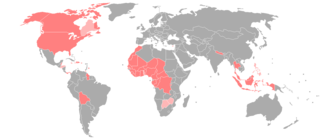Related Research Articles

There are over 525 native languages spoken in Nigeria. The Nigerian official language is English, the language of former colonial British Nigeria. As reported in 2003, Nigerian Pidgin was spoken as a second language by 60 million people in Nigeria.
Gweno is a Bantu language spoken in the North Pare Mountains in the Kilimanjaro Region of Tanzania. The people known as the Gweno are a Chaga ethnic and linguistic group. Since the Chaga people are Bantu speakers, the adopted language contains dialects similar to that of the Kenyan language Kamba. Gweno shares about 54% to 56% of its vocabulary with other Chaga dialects and 46% with Taita dialects. However, a large percentage of its vocabulary is not seen in the other dialects. Also at the start of the 11th century, the Chaga people descended and migrated from the Bantu group in which they migrated to the foothills of mount Kilimanjaro. The Gweno language is today spoken mostly by older adults, with younger generations having shifted to Asu and Swahili. Ethnologue considers Gweno to be moribund; the language is not being passed down because children have not been exposed to Gweno since the 1970s. The generational shift from Gweno to either Asu or Swahili has certainly created shifts in dialect, however Gweno speakers do not see this as a threat.
Tambas is a West Chadic language spoken in Plateau State, Nigeria.
Ebira is a Niger-Congo language. It is spoken by around 2 million people in North central Nigeria. It is the most divergent Nupoid language.
The Nupoid languages are a branch of Volta–Niger spoken in west-central Nigeria, particularly in southeastern Niger State and northern Kogi State. They include the Nupe and Ebira languages, each with about 4 million speakers. Most Nupoid languages have 3 level tones.
The South Plateau languages, also known as Jilic–Eggonic, are spoken in central Nigeria. Eggon has 150,000 speakers and Jili perhaps 100,000.
Ukaan is a poorly described Niger–Congo language or dialect cluster of uncertain affiliation. Roger Blench suspects, based on wordlists, that it might be closest to the (East) Benue–Congo languages. Blench (2012) states that "noun-classes and concord make it look Benue-Congo, but evidence is weak."
Gwari is a kwa language spoken by the Gbagyi people, which make up over a million people in Nigeria. There are two principal varieties, Gbari and Gbagyi, which have some difficulty in communication; sociolinguistically they are distinct languages.
Dibo, a.k.a. Ganagana, Ganagawa, Zhitako, is a Nupoid language spoken in Nigeria. It is spoken in about twenty villages south of Lapai. There is only 66% cognacy with Central Nupe, out of 200 words.
The Rigwe language, Nkarigwe, is a Plateau language of Nigeria spoken by the Irigwe people mainly found in Bassa Local Government Area of Plateau State.
Mbembe is a Cross River language of Nigeria. Odut, a divergent variety spoken in a village far South of the rest of Mbembe, had 20 speakers in 1980 and may be extinct.
Kirya-Konzəl is a recently documented Chadic language of Nigeria, though it was first attested in 1931. The varieties, Fali of Kirya (Kirya) and Fali of Mijilu (Konzəl), are very close.
Gade (Gede) is a Nupoid language of Nigeria. Glottolog 4.7 (2022) classifies it as an independent branch of Benue-Congo rather than as a Nupoid language.
Kakanda is a Nupoid language of Nigeria. Kakanda is spoken in and around Kupa and Eggan. There are scattered villages stretching from the Niger-Benue confluence to as far as Muregi. There are at least 10,000 people. It is most closely related to Gupa and Kupa, although there are also some similarities with Ebira.
Kupa is spoken in villages in Kupaland which are Abugi, Ikin-Sami circus of villages, Ikin-makun circles, Kuchalu, Sampi and Eggan.
Kami is a Nupoid language spoken in Niger State, Nigeria. Kami is spoken only in Ebo town, located to the south of Lapai. There are at most 500 speakers. Kami is closely related to Gupa and Dibo.
Koro Zuba is a Nupoid language of Nigeria. It is one of several languages which go by the ethnic name Koro. However, it has very low lexical similarity with Koro Nulu, which speakers consider to be a variant of the same language due to ethnic identity, and instead is closest to Dibo.

American Sign Language (ASL) developed in the United States and Canada, but has spread around the world. Local varieties have developed in many countries, but there is little research on which should be considered dialects of ASL and which have diverged to the point of being distinct languages.
Koro Nulu, also known as Koro Ija, is a Plateau language of Nigeria, one of several languages which go by the ethnic name Koro. It is not closely related to other languages. It has very low lexical similarity with Koro Zuba, which speakers consider to be a variant of the same language due to ethnic identity. However, the Jilic languages are Plateau and Koro Zuba is apparently Nupoid, and Koro Nulu has yet to be classified.
References
- ↑ Asu at Ethnologue (25th ed., 2022)
- 1 2 Blench, Roger. 2013. The Nupoid languages of west-central Nigeria: overview and comparative word list .
- ↑ Asu language (Nigeria) at Ethnologue (25th ed., 2022)